The digital transformation of our world continues to unfold at a stunning pace and by now affects almost every corner of our public and private lives. Particularly the rise of powerful, autonomous artificial intelligence systems in recent years has reminded us sorely that many questions about our increasingly digital world have yet to be answered. The FOUNDING LAB tackles some of the most pressing matters, like the ever-present threat of misinformation, questions of equitable data usage, and models of ownership in a digitized society to name a few. Who owns technology, data, knowledge, and truth? Moreover, who should own these domains?
As part of this year’s theme exhibition, the IDSA FOUNDING LAB Exhibition highlights the topics explored within the FOUNDING LAB from an artistic point of view. Explorative and open-minded approaches of artists have proven their value to society time and again by offering unusual perspectives and alternative strategies to complex problems. With this in mind, the exhibition showcases carefully selected works proposing creative and sustainable ways to shape our digital word positively. Each project connects individually to the themes and spirit of the FOUNDING LAB, from environmental-friendly technological designs focusing on the specific needs of people to initiatives advocating for alternative ownership concepts, our digital rights and sovereignty over our data.
Ensuring that the digital transformation proves conducive to a fair society is undoubtedly a key issue of our time. With this challenge in mind, all projects presented in the IDSA FOUNDING LAB Exhibition share an important trait: to inspire with tangible ideas illustrating that this process can and must be rooted in firm ethical principles. In short, a new social contract is possible!
-
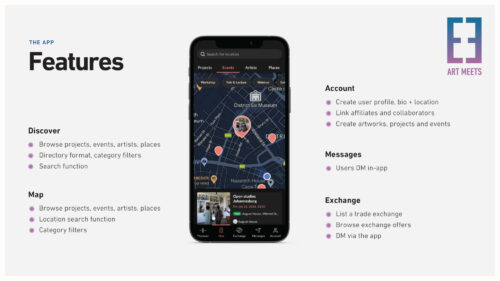
Art Meets
Michaela Limberis (ZA), Precious Mhone (MW), Tammy Langtry (ZA)
The Art Meets app project is a digital platform that promotes, spotlights and connects visual arts ecosystems. In 2020, the Art Meets team hosted an online research project to understand how an app could serve in a specifically African context, particularly in the wake of COVID-19.
-
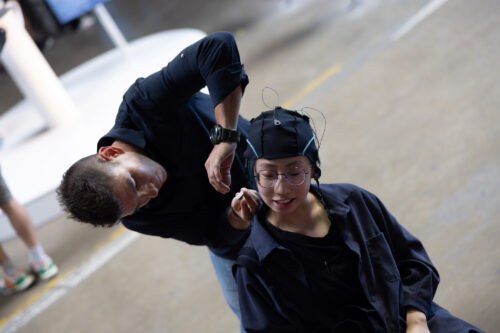
Brain-Computer Interface & Neurotechnology in Games
g.tec medical engineering GmbH (AT)
Get your head into Brain-controlled Games while you learn everything about current and future brain-computer interface technology.
-

CODE 2023
Ars Electronica Garden Utrecht: IMPAKT [Centre for Media Culture] (NL)
How can we help develop a code of ethics for our digital future? How can we change Big Tech into Fair Tech? In CODE artists and non-artists work together to develop projects that can trigger discourse on these urgent questions.
-
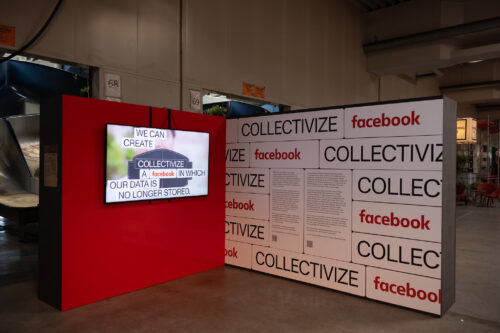
Collectivize Facebook
Jonas Staal (NL), Jan Fermon (BE)
Artist Jonas Staal and human rights lawyer Jan Fermon join forces in their initiation of a collective action lawsuit against Facebook. Combining progressive law and art, Fermon and Staal claim we must reclaim the collective creative work and investment behind trillion-dollar companies.
-
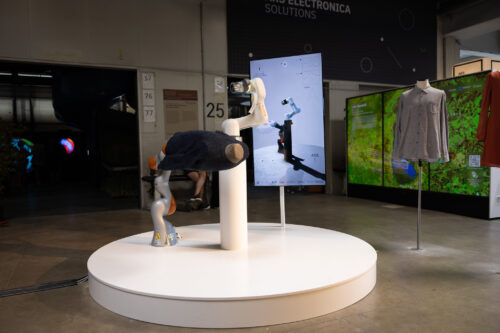
Fashion and Robotics
Ars Electronica Garden Linz: Creative Robotics, University of Arts Linz (AT)
FAR implements a designer-centric framework based on visual programming, combining parametric design with collaborative robotics for the purpose of increasing sustainability in the fashion industry.
-
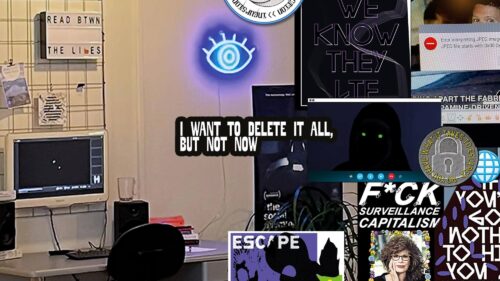
I want to delete it all, but not now
Roos Groothuizen (NL)
I want to delete it all, but not now is an unsolvable escape game that challenges our personal motives for escaping the data industry. We all have thought about going offline or exploring alternative platforms, but what is holding us back?
-
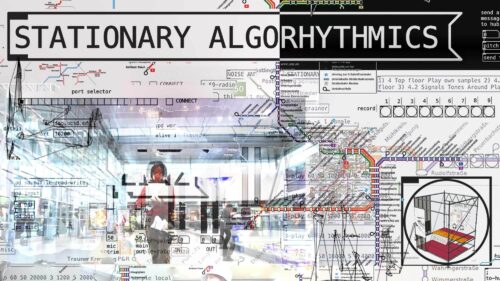
IDSA Founding Lab Summer School Exhibition
IDSA Founding Lab
In the context of this year’s IDSA Founding Lab Summer School, students worked in groups on topics such as Biotechnology and Art, Computer Music, Creative Robotics, Brain-Computer Interfaces, Future Materials and AI/Data Bias. During the Ars Electronica Festival, the public is invited to visit the students’ exhibition.
-
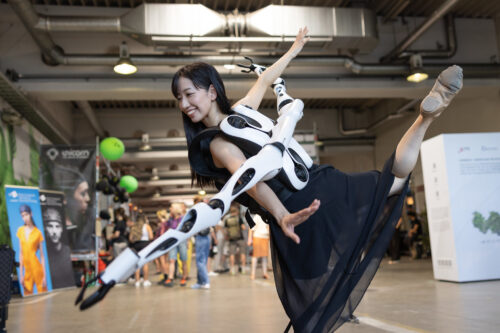
JIZAI ARMS
JIZAI ARMS project team (JP), The University of Tokyo (JP)
Half a century since the concept of a cyborg was introduced, digital cyborgs, enabled by the spread of wearable robotics, are the focus of much research in recent times. JIZAI ARMS is a supernumerary robotic limb system consisting of a wearable base unit with six terminals and detachable robot arms.
-
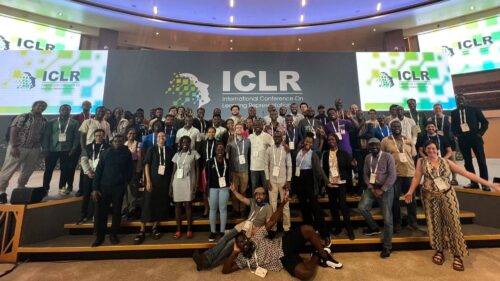
Masakhane – pioneering participatory approaches to building African language technologies, for Africans, by Africans
Masakhane (INT)
Masakhane is a grassroots organization whose mission is to strengthen and spur NLP research in African languages, for Africans, by Africans. Even though 2000 of the world’s languages are African, they are barely represented in technology. The tragic past of colonialism has been devastating in terms of their support, preservation, and integration.
-

MEMESIS
Pamela Neuwirth (AT), Harald Purrer (AT), Simone Boria (GB/AT)
We refer to the pillars of robotics (Asimovs Robotic Laws), information theory (Claude Shannons “useless machine”) and cybernetics (Turing-Test): In hyper-communication with the machine, humans recognizes that their insight is limited, so that the machine seems to have a life of its own. In the discrete therapeutic situation of MEMESIS, illusion and reality collide.
-
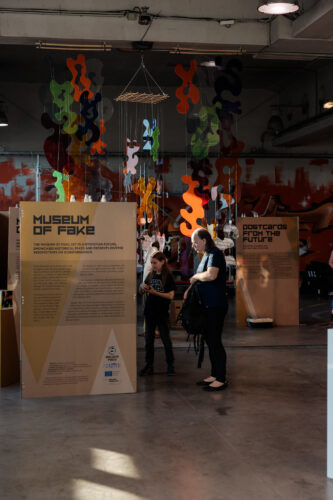
Museum of Fake
Ars Electronica Garden Hallein: Escape Fake 2.0 (AT)
Exhibition visitors are invited to take a trip to a future Museum of Fake together with Hannah, a quantum reality hacker. Together, they look back at the year 2023 and try to assemble a picture of the trajectory of disinformation. What role did generative AI or blockchain-based verification systems play in Hannah’s future reality?
-

postUNI
Lisa Ackerl (AT), Daniel Schöngruber (AT), Marco Thaller (AT)
What if the PostCity Linz were not demolished but repurposed? Three architecture students show how an educational campus could be created at the Ars Electronica 2023 festival location.
-
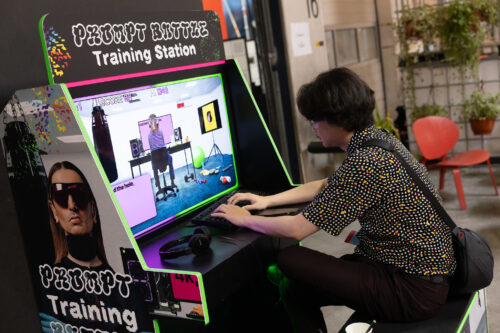
Prompt Battle Training Station
Sebastian Schmieg (DE)
Do you have what it takes to be a prompt engineer? Train your skills at the Prompt Battle Training Station and prepare for the prompt battles of the future.
-
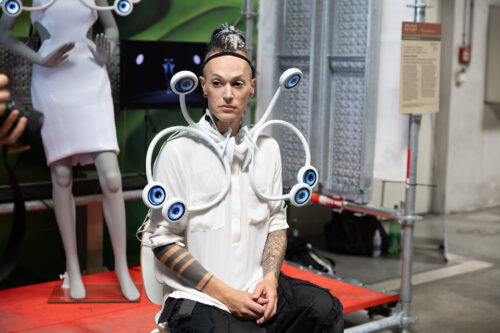
Screen Dress
Anouk Wipprecht (NL) in cooperation with g.tec medical engineering GmbH (AT), OnShape (US), Hewlett Packard (US)
Fashion controlled directly by the brain: This 3D printed dress aims to create a technology-based dialog between the body and the wearer’s environment, using fashion as a new kind of interface: controlled by EEG! The result is a unique FashionTech dress that includes a wearable neck accessory with small round screens that branch out from…
-
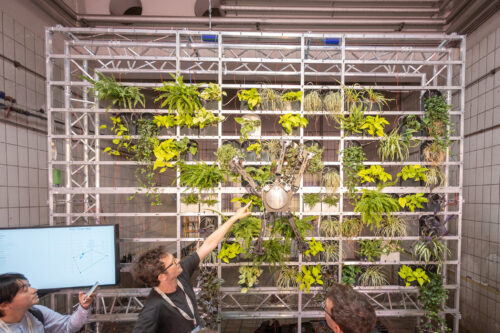
StellaVerde
Gregor Krpič (SI), Simon Gmajner (SI), Dr. Jan Babič (SI), Dr. Marko Jamšek (SI), Gal Sajko (Jožef Stefan Institute) (SI)
StellaVerde is a vertical garden arrangement, in which a functional connection between animals, plants and robots allows plants and animals (in this case fish) to use robots according to their needs. The robot, in this case a five-legged spiderbot, interprets the data and translates it into a watering rout(in)e for the spiderbot.
-
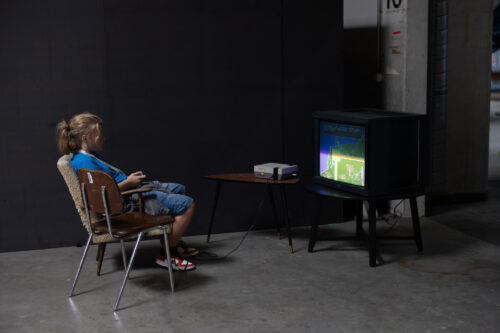
What Remains
Iodine Dynamics – Arnaud Guillon (FR), Chun Lee (TW/UK), Dustin Long (US), Aymeric Mansoux (FR) and Marloes de Valk (NL)
It is 1986. You just came home from a skate session when a video game cartridge falls into your hands. As you plug in the cartridge a strange list of encrypted files appears. You are on the cusp of uncovering a dark secret threatening everyone. What Remains is an 8-bit game for the NES console.
